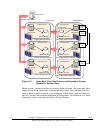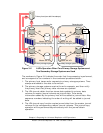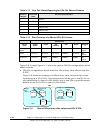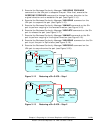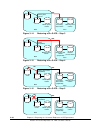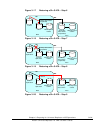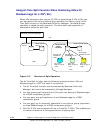
Chapter 3 Preparing for Universal Replicator z/OS Operations 3-25
Hitachi Universal Replicator for IBM /OS User’s Guide
Note*21: The volume can be used as a secondary data volume only when you
restore a URz pair or perform a Business Continuity Manager YKRESYNC
REVERSE operation. However, even in this case, you cannot use the volume
as the secondary data volume of the URz pair for delta resync operation.
Note*32: This is "No" if more than one primary storage systems and more
than one secondary storage system are used for remote copy (see section
Using Multiple Primary and Secondary Storage Systems).
Virtual LVI
You can perform Virtual LVI operations on primary and secondary data
volumes in URz pairs. If you need to perform Virtual LVI operations on a URz
primary data volume or secondary data volume, you must delete the pair first
to return the volume to Simplex status.
When creating a URz pair consisting of two Virtual LVI volumes, make sure
that the primary data volume and the secondary data volumes have the same
capacity.
Cache Residency Manager
You can perform Cache Residency Manager operations on URz primary data
volumes and secondary data volumes.
ShadowImage for z/OS
®
URz and ShadowImage for z/OS
®
(SIz) can be used together in the same
storage system and on the same volumes to provide multiple copies of data at
the primary and/or secondary sites.
Table 3-12 describes the host pair status
reporting for URz volumes, SIz volumes, and URz/SIz shared volumes.
Table
3-13 shows the currency of the data on a shared URz/SIz volume based on
URz and SIz pair status.
• For shared URz/SIz volumes, the URz pair status is reported to the host if
you query the URz primary data volume or secondary data volume. To
obtain the SIz pair status, query the target volume (T-VOL) of the SIz pair.
• SIz supports multiple T-VOLs for each source volume (S-VOL). If you issue
a pair status query to a SIz S-VOL (e.g., pairdisplay), the status for only
one SIz pair is reported (the pair with the T-VOL with the lowest LDEV ID).
To obtain the pair status for the SIz pair(s) with the other T-VOL(s), you
must direct the host query to the specific S-VOL using the T-VOL’s LDEV ID
in the host command. The SIz remote console software displays the port,
TID, LUN, LDEV ID and SIz pair status of all T-VOLs associated with a
S-VOL.



